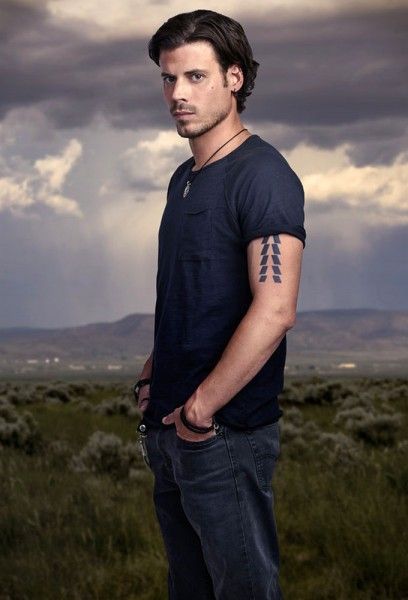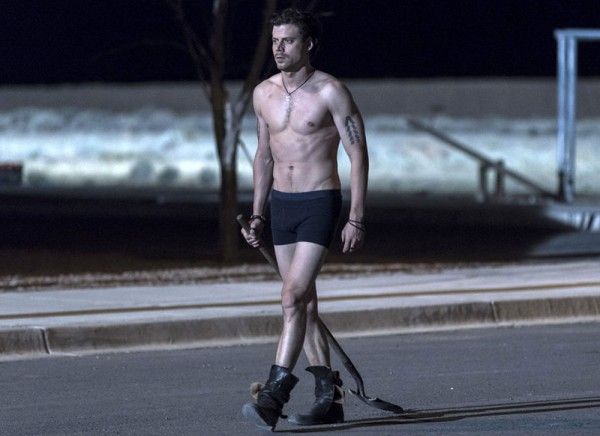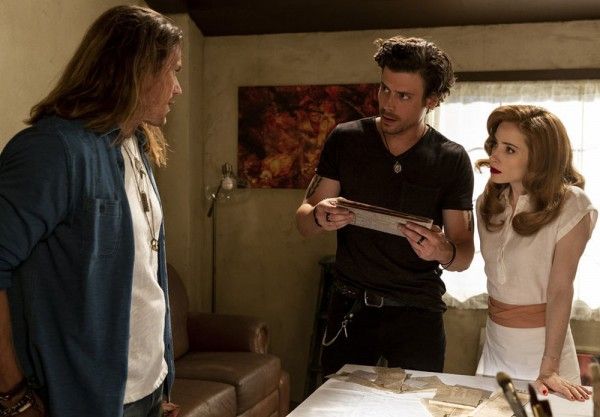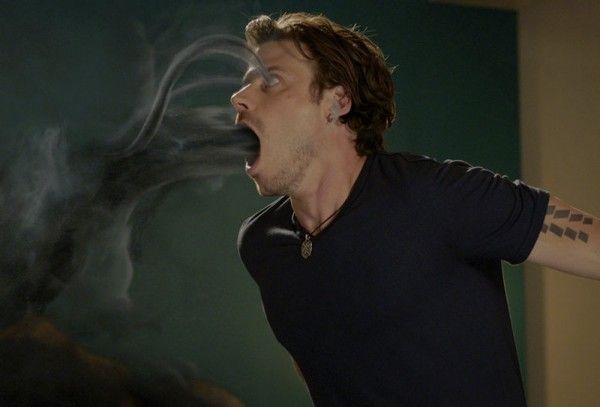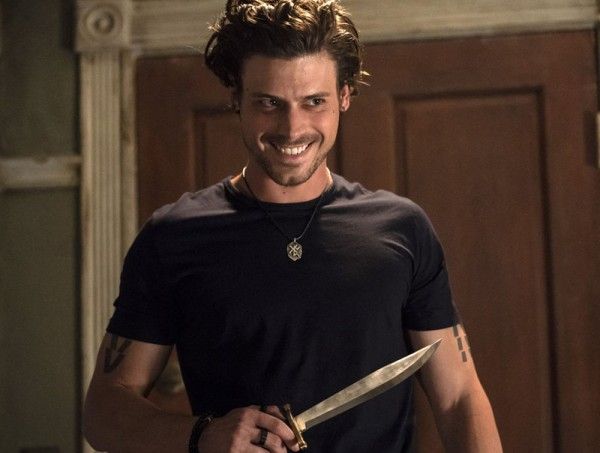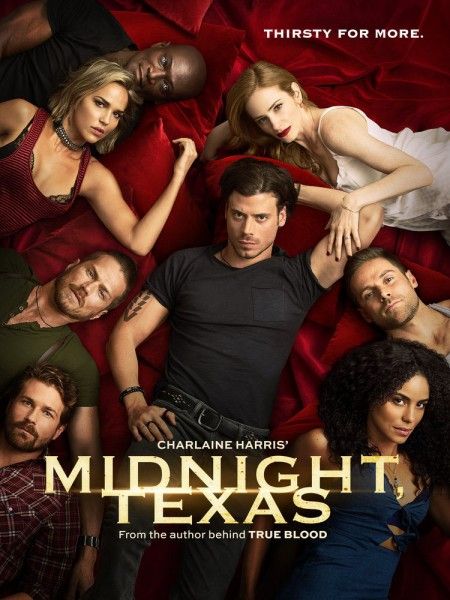From co-showrunners Eric Charmelo and Nicole Snyder and based on the best-selling book series by Charlaine Harris (author of the novels that inspired True Blood), Season 2 of the NBC series Midnight, Texas sees the bond between the residents of Midnight stronger than ever, especially after surviving the events of Season 1. But when a hotel opens in town and the mysterious new owners show up, they bring a whole lot of tourists into a town with a whole lot of secrets and where nothing is what is seems.
During this 1-on-1 phone interview with Collider, actor Francois Arnaud (who plays Manfred, a charming and powerful psychic who can communicate with spirits better than he can deal with the residue that they leave behind) talked about amping everything up for Season 2, his suggestion for what he wanted to see from Manfred, how he ended up in a scene in only his underwear and boots, figuring out how to play someone with demon cancer, playing such extremes within the same role, how Manfred feels about the town’s newest residents, and just how bold and wild things will get, by the end of this season.
Collider: Last season was crazy and wild, but it seems like there’s just more of everything this season.
FRANCOIS ARNAUD: I think that was the aim for this year, to lean more into the mindless fun, as well as into the political undertones. It’s a little all over the place, but I think it’s also more obviously self-aware, and I very much enjoyed that. I think the new showrunners really found their footing pretty quickly, and I’m really happy with the new season.
Because it took some time for the Season 2 pick-up to be announced and the show came back with new showrunners, were you ever worried that one season might have been it and that you weren’t going to get a chance to keep telling this story?
ARNAUD: It certainly sounded like a possibility, at some points. What was important to me is that, if we did get a second season, that we were gonna do it the right way, and having a little bit of time between Season 1 and Season 2 wasn’t necessarily a bad thing. It certainly allowed me to come back to it embracing what it was, having had some time to reflect on it, what I wanted to do with the character, and where I wanted to take it. I had really good, extensive chats with the writers, and they were open to my ideas. For the season premiere, for instance, I don’t know if that’s what they had in mind, in the first place, but they reached out and I said that I would love to explore the aftermath of what had happened. I thought that was a great opportunity to jump into Manfred’s anger. I had some things in my life, at that time last winter, that made me very angry, so I was in a really good place to tap into that. I was like, “I really wanna shout right now! If you think you’re willing to let me do that for the show, I think I’ll do it well.” And then, they came up with the storyline for demon cancer.
It seems like it would have been hard to have him go through what he went through at the end of last season, and then wake up the next day and be totally good with it all.
ARNAUD: I know, but it felt like, sometimes in the first season, that happened too much. We didn’t fully explore various opportunities to their full potential, and I felt like it would be a mistake to just move on from that too quickly. As Season 2 goes on, especially in the second half of the season, I was pleasantly surprised with how ambitious the writing and mythology is. We really go into unchartered territories. I don’t even know how to hint at it without saying too much, but it becomes this really hard sci-fi, which I’ve never seen on television, and somehow doesn’t feel forced. It feels like it’s completely warranted. And by the end of it, I think it’s very satisfying. It was satisfying for me, and I think it will be for the viewers, hopefully.
While you were sharing your ideas with the showrunners, at any point, did you question why you were wandering around town in your underwear?
ARNAUD: I don’t really know what to say to that. It wasn’t problematic for me. I felt like it was in the right place. It didn’t feel exploitative. I always love when nudity doesn’t come from sensuality and there’s no pressure to be sexy. I think nudity is a tool that is too often used to talk about romance. For me, there’s a great thing about someone walking around in the nude. It’s so upsetting. It speaks of clearly unresolved mental issues, and to use that from the get-go, just to kick off the season, I thought was a really strong start.
At least he remembered to put his boots on, so you didn’t have to walk around barefoot for whoever many hours.
ARNAUD: True. There were a lot of pre-production meetings about the boots. I was totally willing to go barefoot, since it would make more sense, if I’d just gotten out of bed, but I think there was something even more unusual about someone in his boxer-briefs and leather boots.
Clearly, Manfred is not having the best time of things, when the season starts. How do you prepare to play someone whose dealing with demon cancer? How did you figure out exactly what that would look and feel like?
ARNAUD: I know that the showrunners hinted at parallels between Manfred and Jack Nicholson’s character in The Shining, so there’s a little bit of inspiration that came from there. But for me, with Manfred, it’s always been about his internal struggle to just maintain appearances and keep evil spirits out of himself, or kick them out when he’s done with them. What I really like is the sense of relief that he gets from finally going, “Fuck it!,” and just jumping in and giving into it. That makes it all the more scary that he finds it so pleasurable.
What’s it like, for you as an actor, to get to play those extremes of the character, especially as he’s going after some of his friends and you have to essentially try to kill your co-stars?
ARNAUD: There’s a lot to work with. There’s a lot to draw inspiration from. That’s part of the fun in playing someone like Manfred, in this context. You’re not tied to normal character study. Things have to make sense, and there is an arc for Manfred, but it’s punctuated by moments of invasion from others, whether it’s ghosts or demonic cancer. There’s an episode where Manfred goes through something heartbreaking, and I tried to ground it as much as I could, even though the stakes are higher than most of what a normal human goes through. I tried to ground it and make it as real as possible, so that there’s very real, tangible, probable heartache that he’s going through, and yet, right after he goes through something horrible, he gets possessed by this insanely comic entity. There’s a whole sequence in that episode that I would never be allowed to do otherwise. I don’t think I’ll ever be able to do anything like this again. I get to play an old Russian lady, while Manfred is going through the hardest time of his life, and I was able to lean into the comedy and absurdity of it all. That makes it all the more heartbreaking when you come back to what Manfred was going through before.
When you’re an actor playing a character like this, where he’s consistently a little bit crazy because he doesn’t know when someone is going to invade him, who they are, or what they’ll do to him. Is that really fun to do, or is it surprisingly also really exhausting?
ARNAUD: Both. There’s really a satisfaction that comes from going there, and I find that, as an actor, in general, most extreme emotions or physical scenes that appear exhausting are actually the easiest to do because there’s nothing else to do, but throw yourself into it. It’s a lot harder to wait around on set for 14 hours and have two lines. You’re exhausted from waiting, but by the time they get to you, you don’t know how to speak anymore. Whereas when you’re just in it, like when I'm chained to the chair in the first episode back, throwing up black goo and being exorcized and improvising insults to my co-stars, it’s just so easy to stay in it. You just stay in it the whole time and it is exhausting, but then you get a great night of sleep after.
It can’t be hard for Manfred to understand why Creek would just be over it and not want to deal with it anymore.
ARNAUD: Yeah I think that’s why they both move on, although she is back, at some point. The selfless thing to do now is to accept that she’s been through enough, after having a psychotic brother and her father being an apologist. Maybe it’s not that hard to understand that she deserves better than to be sleeping with the enemy.
Because the residents of Midnight are typically either running from something or have something to hide, how much does it suck to have tourists in and out of town, all the time now?
ARNAUD: I think it’s potentially good business for Manfred. He hasn’t been working much. He’s got too much on his hands. It certainly transforms the vibe of the town entirely. Who would have thought that this shithole in the middle of the desert would become this buzzing hipster retreat? I think Manfred is very concerned, from the start. Olivia is concerned by the arrival of the visitors whereas Manfred is concerned for them because he knows the dangers that they’re now exposed to, in that building. Very early on, people are put through literal life-threatening moments. Being a master of making bad decisions, Manfred develops a bond with Patience, who’s married to Kai, the owner of the hotel.
How does Manfred feel about Kai, at least initially? Is he jealous of him?
ARNAUD: I think Kai’s more jealous of Manfred. I think it’s the other way around, really. Manfred is genuinely grateful that Kai saves his life and essentially saves the Midnighters, as well, by the end of the first episode. Kai, as played by Nestor Carbonell, is very stand-offish with Manfred. Even though Manfred is feeling grateful, I can’t see it lasting very long because Kai is particularly aggressive towards Manfred, from the start, for unknown reasons, at the moment.
Without Creek being around, at least for a portion of the season, who is Manfred closest to?
ARNAUD: He gets particularly close to Patience, Kai’s wife. He gets a little too close for comfort. But, Manfred has moments with everyone. He’s asked to help pretty much everyone. Even Xylda is back for a minute.
By the time that we get to the end of this season, will we feel a sense of closure for the craziness that goes on, or will we be even more anxious to learn about a possible Season 3?
ARNAUD: It’s so extreme that I can’t even begin how to explain what happens in this season. It’s beyond anything that I’ve ever considered as part of the realm of possibilities, so I don’t know. Maybe it should just be Midnight in Space. It’s really crazy, but it’s still rewarding. I can’t believe they went there. It’s insane! It’s great. It’s almost like an alien invasion. It’s not, but it’s something as big. I don’t know how to hint at it. I haven’t prepared to talk about the end of the season, but it’s great. I was really thrilled. We get to do things that are out of this world, literally. There’s definitely potential for more seasons. I think we really found our groove, and shooting was really a joy. There was a really great sense of collaboration on set, and ambitious plotlines and dialogue. The second season really was a joy for me, and I hope we get to do again. That’s what I can say about the end of the season. It gets really bold and political, with social metaphors, and I’m glad we went there. It’s pretty overtly revolutionary. The news is clearly pretty preposterous, so you have to get really creative to make it seem like it’s science fiction.
Midnight, Texas airs on Friday nights on NBC.


